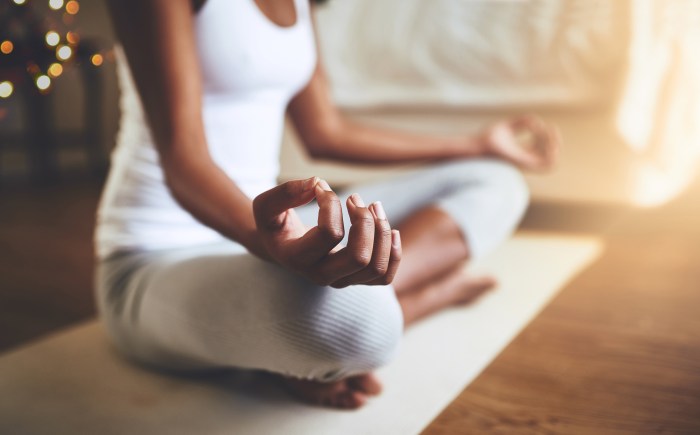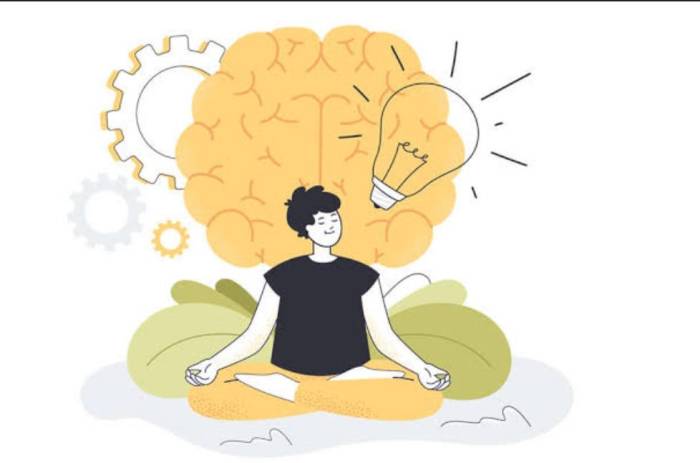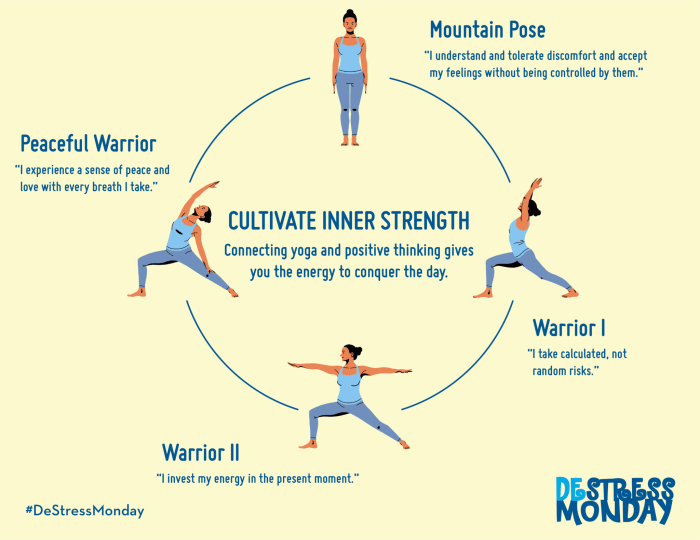As How to Meditate for Developing Inner Strength takes center stage, this opening passage beckons readers with dramatic language style into a world crafted with good knowledge, ensuring a reading experience that is both absorbing and distinctly original.
Embark on a transformative journey as we delve into the art of meditation to cultivate inner strength, exploring techniques and practices that can empower your mind and spirit.
Introduction to Meditation for Inner Strength

Meditation is a practice that involves focusing the mind and eliminating the constant chatter of thoughts. It allows individuals to cultivate a sense of inner peace, clarity, and mindfulness. The benefits of meditation are numerous, including reduced stress, improved concentration, enhanced self-awareness, and emotional well-being.
Developing inner strength through meditation involves building resilience in the face of challenges and adversity. It enables individuals to tap into their inner resources and cope effectively with the ups and downs of life. By cultivating a strong and steady mind, one can navigate through difficult situations with grace and composure.
The Importance of Mental and Emotional Resilience
Mental and emotional resilience are essential in today’s fast-paced and unpredictable world. The ability to bounce back from setbacks, adapt to change, and maintain a positive outlook is crucial for overall well-being. Meditation serves as a powerful tool to develop these qualities, allowing individuals to strengthen their inner resolve and face life’s challenges with courage and equanimity.
Types of Meditation Practices
Meditation offers a variety of techniques that can help in developing inner strength. Each type of meditation has its unique approach and benefits. Let’s explore some of the common meditation practices suitable for cultivating inner strength.
Another essential aspect of meditation is maintaining focus. If you want to improve your ability to meditate with focus, consider implementing these 8 key tips into your practice. These techniques will enhance your concentration and mindfulness.
Mindfulness Meditation, How to Meditate for Developing Inner Strength
Mindfulness meditation involves focusing on the present moment without judgment. Practitioners observe their thoughts, emotions, and sensations without getting carried away by them. This practice helps in developing self-awareness, emotional regulation, and resilience. By staying present and acknowledging our experiences, we can build inner strength to navigate life’s challenges.
Loving-Kindness Meditation
Loving-kindness meditation, also known as Metta meditation, involves cultivating feelings of love, compassion, and goodwill towards oneself and others. This practice helps in nurturing positive emotions, fostering empathy, and enhancing emotional resilience. By extending kindness and compassion to ourselves and others, we can strengthen our inner resources and build a sense of interconnectedness with the world around us.
When it comes to meditation, focusing on your breathing is a fundamental technique. To learn how to meditate with breathing effectively, you can follow these 10 proven methods that will help you achieve a state of calmness and mindfulness.
Body Scan Meditation
Body scan meditation involves systematically focusing on different parts of the body, bringing awareness to physical sensations, tension, and relaxation. This practice helps in developing body awareness, releasing physical tension, and promoting relaxation. By tuning into the body’s signals and learning to relax consciously, we can cultivate inner strength by promoting physical and mental well-being.Each of these meditation practices offers a unique pathway to developing inner strength.
Whether you resonate more with mindfulness, loving-kindness, or body scan meditation, incorporating these techniques into your daily routine can support you in building resilience, emotional balance, and a deeper connection with yourself and others.
Steps to Start Meditating

To begin your meditation practice for developing inner strength, it is essential to establish a routine and create a conducive environment that allows you to focus and connect with your inner self. Consistency and dedication are key to reaping the full benefits of meditation.
Creating a Conducive Environment
Before you start meditating, find a quiet and peaceful space where you can sit comfortably without distractions. Ensure that the room is well-ventilated and has soft lighting to create a calming atmosphere. You may also want to incorporate elements like candles, incense, or soothing music to enhance your meditation experience.
For those seeking success and abundance through meditation, incorporating specific practices can be beneficial. Explore these 7 tips to enhance your meditation sessions and attract positive outcomes in your life.
Importance of Consistency and Dedication
Consistency is crucial when starting a meditation practice. Set aside a specific time each day to meditate, even if it’s just for a few minutes. Over time, you will build the habit of meditating regularly, allowing you to experience the transformative effects of inner strength and peace. Dedicate yourself fully to each meditation session, focusing on your breath and letting go of any distractions that may arise.
Techniques to Enhance Inner Strength Through Meditation

Enhancing inner strength through meditation is a powerful practice that can bring about profound changes in your life. By incorporating specific techniques into your meditation routine, you can further cultivate your inner strength and resilience.
Visualization Techniques
Visualization is a powerful tool that can help you tap into your inner strength and manifest positive outcomes in your life. During meditation, you can visualize yourself as a strong, confident individual, facing and overcoming challenges with ease. By consistently practicing visualization exercises, you can strengthen your belief in your own abilities and boost your inner strength.
Breathing Exercises for Emotional Resilience
Deep breathing exercises are an effective way to promote emotional resilience during meditation. By focusing on your breath and practicing deep, intentional breathing, you can calm your mind, reduce stress, and build emotional strength. Incorporating breathwork into your meditation practice can help you stay grounded and centered, even in the face of adversity.
Role of Mantras and Affirmations
Mantras and affirmations are powerful tools that can help you build inner strength and cultivate a positive mindset. By repeating empowering phrases or affirmations during meditation, you can reprogram your subconscious mind and boost your self-confidence. Mantras and affirmations can serve as reminders of your inner strength and resilience, helping you navigate challenges with grace and determination.
Overcoming Challenges in Meditation Practice: How To Meditate For Developing Inner Strength

Meditation practice for developing inner strength can be a transformative journey, but it is not without its challenges. It is important to acknowledge and address these obstacles in order to maintain a consistent and effective meditation routine.
Distractions and Maintaining Focus
- A common challenge during meditation is dealing with distractions. It can be difficult to quiet the mind and stay focused, especially in a world filled with constant stimuli.
- To overcome distractions, try acknowledging them without judgment and gently guiding your focus back to your breath or chosen point of concentration. Consistency and patience are key in building this skill.
- Practice mindfulness by observing your thoughts and emotions without getting attached to them. This can help you develop the ability to let go of distractions and stay present in the moment.
Dealing with Resistance and Impatience
- Resistance and impatience are natural responses when faced with discomfort or challenges during meditation. It is important to approach these feelings with compassion and understanding.
- When resistance arises, try to explore the underlying emotions or beliefs that may be causing it. By bringing awareness to these feelings, you can work towards releasing them and creating a more peaceful state of mind.
- Practice self-compassion and patience with yourself. Remember that meditation is a practice, and it is okay to have ups and downs along the way. Be gentle with yourself and allow for growth and progress at your own pace.
Integrating Meditation into Daily Life

Incorporating meditation into your daily routine can have a profound impact on your overall well-being. Even with a busy schedule, you can find ways to practice mindfulness and cultivate inner strength through meditation.
Tips for Short Meditation Sessions
- Start your day with a short meditation session: Dedicate just a few minutes in the morning to center yourself and set a positive tone for the day ahead.
- Take mini meditation breaks: Throughout the day, pause for a minute or two to focus on your breath and bring your awareness back to the present moment.
- Use meditation apps: Explore various meditation apps that offer guided meditation sessions designed for busy individuals.
- Create a designated meditation space: Find a quiet corner in your home or office where you can retreat for a quick meditation session whenever needed.
Benefits of Practicing Mindfulness in Everyday Activities
- Enhanced focus and concentration: Mindfulness helps you stay present and fully engaged in whatever task you are doing, leading to improved productivity.
- Reduced stress and anxiety: By practicing mindfulness in daily activities, you can learn to let go of worries and concerns, promoting a sense of calmness and peace.
- Improved relationships: Mindful interactions with others foster better communication, empathy, and understanding, strengthening your connections with those around you.
How Meditation Helps in Coping with Stress and Enhancing Well-being
- Stress reduction: Meditation techniques such as deep breathing and visualization can help calm the mind and body, reducing the negative effects of stress.
- Emotional resilience: Regular meditation practice enhances emotional regulation and coping mechanisms, allowing you to navigate challenges with greater ease.
- Overall well-being: By integrating meditation into your daily life, you cultivate a sense of inner peace, contentment, and harmony that positively impacts all aspects of your life.
In a world filled with chaos and uncertainty, mastering the art of meditation for inner strength becomes a beacon of hope and resilience. Let the wisdom gained from this guide be your guiding light towards a more empowered and harmonious existence.